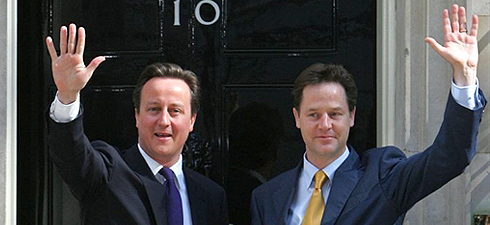The Financial Times cautiously welcomes the arrival of Tory leader David Cameron to No. 10 Downing Street . "This is the right result for the country. The terms of any pact between the Tories and the Lib Dems will need to be scrutinised. But it will at least deliver the parliamentary votes that are needed to provide stable government. It is to be hoped any deal will be both robust enough and sufficiently long lasting to allow the government to take the tough decisions that will be required." The London business daily is relieved that given the parlous state of Britain's public finances with a Eurozone crisis in the background, that almost a week without government did not precipitate a financial meltdown. "But the new government must show urgency in getting to grips with Britain’s fiscal problems. The country is still running a fiscal deficit of 11.1 per cent of output. In 2010, 15 per cent of the debt issued by all European states will be British. Only Italy needs to borrow more."
Traditionally Labour leaning The Guardian, which came out in favour of the Lib-Dems during the election campaign, laments that a "window of opportunity for the centre-left" closed on the afternoon of May 11. "The Liberal Democrats and Labour had a historic opportunity to form a democratically legitimate progressive coalition at a crucial moment. Labour appears to have bent over backwards to make policy compromises. In the end it was the Liberal Democrats who said no thanks, this is not going to work for us, and headed for Mr Cameron's door instead...
Anything might happen next
But will this unlikely coalition last? In the Daily Telegraph, Simon Heffer predicts that the Con/LIb alliance will be unsatisfactory and short-lived because of the political ambivalence of new Deputy PM Nick Clegg's party. The Lib Dems "is composed largely of Leftists of the sort who find the Labour Party a little common; and in part of people who agonise permanently over whether to join the Conservatives. That decision seems now to have been made for them. The price, however, of any support, formal or otherwise, for the Conservatives will be that the Lib Dems will be widely obliterated when next at the polls. Their Leftists would never forgive them. Labour and the Greens would be the only beneficiaries."
Geoffrey Wheatcroft in The Independent wryly looks back on an election that was "bitterest of all for the Tories", who "had every reason a few months ago to think they would win the election with a parliamentary majority, rather than a plurality which leaves them bargaining and horse-trading." Wheatcroft asserts that the British electorate suspects David Cameron's high Tory background of privilege - "the handsome country home in Berkshire, the aristocratic connections, the prosperous stockbroker father who was chairman of White's, grandest of London clubs: altogether the most gleaming of silver spoons." On a more serious note, he detects trouble for Cameron in an aging party with a fiercely europhobic rump - "Now Cameron enters No 10 without a clear mandate from the public and with a number of powerful and barely quiescent enemies in his ranks. In the strange new landscape we have entered, anything might happen – even the final disintegration of the Tories, the oldest political party in Europe."
Nick Clegg has tasted of the fountain of Brussels
How the tradionally euro-sceptic Conservative party is to negociate a coalition with the Liberal Democrats, "the most pro-European of British parties", raises eyebrows at Gazeta Wyborcza. The Warsaw daily predicts that as Cameron must handle “huge challenges” at home, including a jaw-dropping national debt of 88% of GDP (an estimated £343bn/ €403bn) he most probably will not go to war with the EU. Rzeczpospolita quotes a political scientist at Nottingham University, who asserts that differences regarding EU "will not play an important role... But sooner or later they will resurface." Not least because the Tories in 2009 created a new parliamentary block in European Parliament with Poland's arch nationalist and eurosceptic opposition Law and Justice party (PiS), along with Central and Eastern Europeans groupings with links to the far-right.
Aside from the lunatic fringe of Mitteleuropa politics, just what are the concessions that former MEP Nick Clegg, who, as Il Sole 24 Ore notes, "has tasted of the fountain of Brussels" must make? Undoubtedly, the Milanese daily writes, Clegg must accept that "the euro is completely out of the question". Spanish daily Público also alludes to the fact that new Foreign Secretary William Hague "is at the head of Tory hopes in demanding of the EU the hand-over of powers back to member states" in the fields of justice, employment and social policy. Concluding that the new government promises to be "two-headed", this euro-conundrum is further underlined with Barcelona's La Vanguardia pointing out the Tories have also promised that "any future transfer of power to Brussels will be subject to referendum."
On a lighter note, Belgian daily De Standaard seeks to allay fears that the youngest prime-minister for almost two centuries is Margaret Thatcher in disguise. Forty-three year old Cameron is "not really anti-European and he's even pro-environment. He even changed his party's colour from blue to green." Euroscepticism, however, is nothing to worry about for Nicolas Sarkozy. According to Le Figaro, the French president informed his party's MPs that Mr Cameron will "do like the others. He'll start out anti-European and he'll finish pro-European. That's the rule."
Was this article useful? If so we are delighted!
It is freely available because we believe that the right to free and independent information is essential for democracy. But this right is not guaranteed forever, and independence comes at a cost. We need your support in order to continue publishing independent, multilingual news for all Europeans.
Discover our subscription offers and their exclusive benefits and become a member of our community now!












